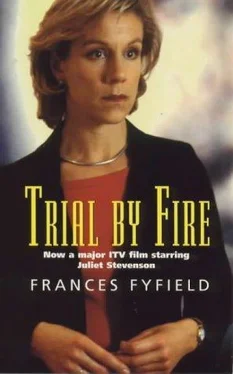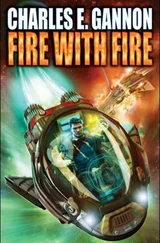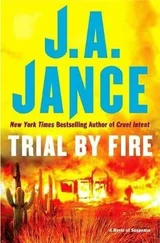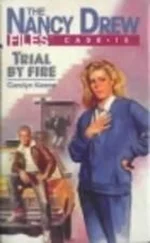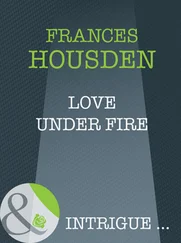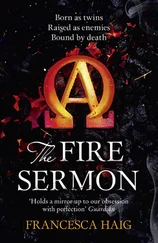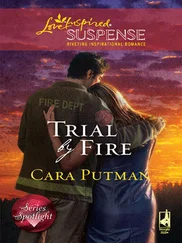Frances Fyfield - Trial by Fire
Здесь есть возможность читать онлайн «Frances Fyfield - Trial by Fire» весь текст электронной книги совершенно бесплатно (целиком полную версию без сокращений). В некоторых случаях можно слушать аудио, скачать через торрент в формате fb2 и присутствует краткое содержание. Жанр: Полицейский детектив, на английском языке. Описание произведения, (предисловие) а так же отзывы посетителей доступны на портале библиотеки ЛибКат.
- Название:Trial by Fire
- Автор:
- Жанр:
- Год:неизвестен
- ISBN:нет данных
- Рейтинг книги:3 / 5. Голосов: 1
-
Избранное:Добавить в избранное
- Отзывы:
-
Ваша оценка:
- 60
- 1
- 2
- 3
- 4
- 5
Trial by Fire: краткое содержание, описание и аннотация
Предлагаем к чтению аннотацию, описание, краткое содержание или предисловие (зависит от того, что написал сам автор книги «Trial by Fire»). Если вы не нашли необходимую информацию о книге — напишите в комментариях, мы постараемся отыскать её.
Trial by Fire — читать онлайн бесплатно полную книгу (весь текст) целиком
Ниже представлен текст книги, разбитый по страницам. Система сохранения места последней прочитанной страницы, позволяет с удобством читать онлайн бесплатно книгу «Trial by Fire», без необходимости каждый раз заново искать на чём Вы остановились. Поставьте закладку, и сможете в любой момент перейти на страницу, на которой закончили чтение.
Интервал:
Закладка:
The place had never been so clean or she herself so bare of hope. She was sickened by her inadvertent discoveries, made while she was in search of the inevitable bills, which were not suspended during his imprisonment, and she was dismayed by her own resilience. She moved towards the cottage like an automaton, trying to think of him and resurrect her early belief that this was all a mistake and one day he would live there again, even live there with her; it was larger than her place.
But that early optimism had faded despite her persistent nurturing of it, turned brown and desiccated like the leaves in the garden, helpless in the temperature of her own cold realism. She had little faith in a system of justice that spewed so many of her clients into her lap, but was fair enough to realize the same system, clumsy but relatively incorrupt, got it right at least half of the time and was as necessary as breath. She knew very well how casualties were created by life itself, not by authorities, and was also aware that Antony, her lover, had been treated as fairly as most. It was nothing as simple as the system that begat her own tremor of doubt; it was Antony.
While tidying his study in search of the gas bill – this indescribable mess of a man was so hooked on the printed page that he could never dispose of a single sheet of paper – she had found the beginnings of a novella, snapshots of his childhood, which made her weep, pictures of previous girlfriends, which made her peculiarly, possessively irritated, and a little bundle of fairly recent love letters from an unknown pupil, sadly signed in childish, educated script with the anonymous words, 'Yours Ever,' which made her furious. She knew they were recent because of references to local events, such as 'I saw you at the carnival last week, by the rose float; you looked very handsome'.
She knew, too, he would never have responded to this moony devotion, but he should have established through the handwriting who had written them, returned the first letter with an admonition and surely not accepted more. Encouraging students to make a habit of writing was one thing; keeping the results was another. Whether he hoarded from carelessness mattered not. Whatever would he do for flattery, such a precious gift to him, poor man, the same weakness leading him to dead Mrs Blundell and all of this betrayal?
Before the discovery of the letters, Christine had always respected Antony's integrity despite his mistakes, liked his enthusiasms despite his excesses, cherished his affections with all their past lack of discrimination, but on sight of those letters, the whole image of him began to slip, the respect fading by a dangerous degree, tinged by treacherous memories of his passion with its underlying violence.
Were all men thus, madness lurking in their veins, following their organs to disaster because of a kind word, blindly obedient to subliminal commands? She suspected they were, was very tired of the breed, angry with him for what he was.
An element of disgust began before the committal proceedings. Evidence had unfolded while more doubts formed like a mushroom cloud. Christine sat beneath it humbled to camp follower and only supporter, fighting back reluctant belief in what she heard, while there gathered behind her eyes a huge resentment. Not for what he had done to Mrs Blundell
– she could not in all honesty bring herself to care about that, although she wished she could
– but for what he had done to her. For better or worse, from poorer to poorer, she knew, whatever the outcome, she could not forgive him.
She had seen him in a new light while trying to shade it, viewed what she should never have seen, found him lacking, and wondered how she could ever again love him, and she was full of remorse for having come to doubt him. Even when she had never loved anyone half as much before, her mind had already moved to planning life without him, just as she was constantly advising her clients:
Think of yourself, dear, you must, you know, no one else will. The last rat leaves the sinking ship; I don't know how love goes, but when it's gone, it's gone. Not without a self-hatred so acute it left her breathless.
So this was duty, obdurate, labour-intensive duty to prove to herself she still cared; she owed him that much, at least. Thou shalt not be guilty, dearest Antony, before trial, but after that, my pet, I shall have to leave you. I cannot sacrifice my life to you, only part of it.
Tears hot on a flushed face, attacking this messy garden of his. Oh, why did he never do anything about it and why did he shatter my peace of mind? Look at this mess. He never looked after it, lived here three years and never raised spade or trowel. How could he?
What a waste.
The previous owners had made an effort, left him with a format. It was a tiny garden: small patio from the kitchen, twenty feet of lawn bisected by path, shrubs standing like soldiers against each fence, a miniature shed, and a patented compost thing looking like a large and ungainly dustbin. She raked the overgrown lawn and the scrubby beds free of leaves. She had carried her rake here for the purpose. Why had he never bought one of his own? Sweeping up leaves awkwardly, putting them in the compost bin with disgust.
That was where he had put the dead woman's clothes and handbag -sorry, someone else had put her clothes and handbag there. That was what Christine was supposed to believe and couldn't any longer. Strangely, that piece of evidence had failed to register with her at all until she had heard it read out loud, hadn't thought of it until it slapped her in the face. Now she did, and she was suddenly arrested by its incongruity with everything she knew of him.
That he would strike the woman, yes. Take her money and jewellery, no. Put the remnants here, no: he simply wasn't materialistic enough.
The gate at the side of the cottage clicked. Full of sinister thoughts, she turned in alarm, faced Bailey, dear Superintendent Bailey, the bastard, standing in his workday suit, beginning to speak. She stood up like a lioness in a cage, snapped in a voice that was all teeth,
'What do you want?'
`Nothing specific. Passing, and saw your car.'
She was angry, turned back abruptly, and began attacking the leaves, which floated from control, presenting her behind conspicuously, determined to ignore him. He simply fell in, grasping piles of damp leaves with skill and efficiency, shoving them into the compost bin, pressing them down, going back for more, quietly ignoring the effect on his suit and hands.
They worked in silence for fifteen minutes, clearing the leaves with speed, she found herself oddly mollified, disliking his presence less and less. She even felt the beginnings of a faint amusement, glad of the company. 'All right,' she said finally, flinging down the rake.
'You win. Now, what was it you really wanted?'
She sat on the single dirty patio chair. He sat on the wall next to it.
I was wondering,' he said mildly, as if the conversation was the most natural in the world and this was the middle of it. 'Looking at this garden, I was wondering how Antony ever knew where the compost bin was. Or that he had one at all. Surprising. Not a keen gardener, I take it.'
`No, ' she agreed curtly, suddenly reminded of the incongruity that had struck her before he arrived. 'He usually forgot he had a garden. Didn't really recognize its existence.'
I see.'
He did see, she thought; he saw what others had failed to see. He was all nerves and nerve, a complicated man, looking for something. In one fleeting instance she could imagine what Helen had found in him.
`Did you like him?' she asked gruffly. 'Antony, I mean.'
I didn't – don't know him well enough to say. I do try to distance myself from suspects, murder suspects particularly, because I hate, loathe, and detest violence. I find it difficult to take the rest seriously, but violence sickens me.'
Читать дальшеИнтервал:
Закладка:
Похожие книги на «Trial by Fire»
Представляем Вашему вниманию похожие книги на «Trial by Fire» списком для выбора. Мы отобрали схожую по названию и смыслу литературу в надежде предоставить читателям больше вариантов отыскать новые, интересные, ещё непрочитанные произведения.
Обсуждение, отзывы о книге «Trial by Fire» и просто собственные мнения читателей. Оставьте ваши комментарии, напишите, что Вы думаете о произведении, его смысле или главных героях. Укажите что конкретно понравилось, а что нет, и почему Вы так считаете.
